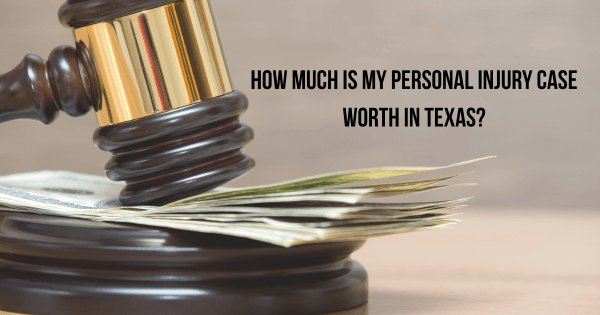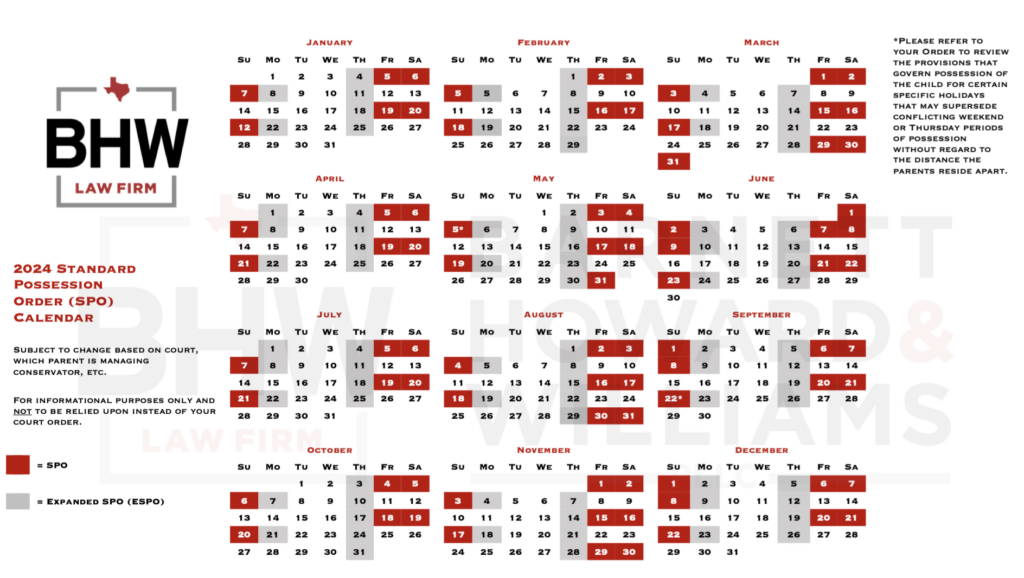

Wondering how much your personal injury case is worth in Texas? Learn what factors impact your settlement or verdict.
If you’ve been injured in an accident in Texas, one of the first questions you may have is: “How much is my case worth?” The truth is, there isn’t a one-size-fits-all answer. Every personal injury case is unique, and the value of a claim can depend on a variety of factors—from the nature of the injuries to the extent of negligence. In this blog post, we’ll break down the essential elements that affect the value of a personal injury case in Texas, helping you get a clearer picture of what to expect.
The Basics: Types of Recoverable Damages
When you pursue a personal injury case in Texas, you’re generally seeking compensatory damages—the financial award meant to cover the losses caused by your injury. These damages fall into two main categories:
Economic Damages
-
- Medical Expenses: This includes hospital bills, medication costs, physical therapy, and future medical expenses related to the injury.
- Lost Wages: If you have to take time off work, you can seek compensation for lost income. If your injury affects your long-term earning capacity, you may also be entitled to future lost wages.
- Property Damage: If your personal property (like a vehicle in a car accident) was damaged, the cost of repairs or replacement can be included.
Non-Economic Damages
-
- Pain and Suffering: In Texas, you can recover damages for physical pain, mental anguish, emotional distress, and related issues.
- Loss of Consortium: Spouses and sometimes family members may be able to recover damages if the injury has affected the relationship.
- Loss of Enjoyment of Life: If your quality of life or your ability to engage in hobbies and activities you once enjoyed has been diminished, these losses can sometimes be compensated.
In rare cases, you might also be eligible for punitive damages if the defendant’s actions were especially reckless or malicious. However, punitive damages are subject to specific legal standards and caps in Texas.
Factors That Influence the Value of Your Case
Calculating the value of your case involves weighing several important factors:
Extent of Injuries – The severity of your injuries plays a major role. For example, minor cuts and bruises generally lead to lower-value claims than permanent disabilities or severe injuries requiring ongoing medical treatment.
Clear Liability or Fault – If there’s little doubt that the other party was at fault—say, in a car accident where the other driver was clearly negligent—your chance of receiving a higher settlement increases. Texas follows a modified comparative fault rule, meaning your compensation might be reduced if you bear some responsibility for the accident. If you’re found 50% or more at fault, you may be barred from recovering damages altogether.
Evidence and Documentation – Solid evidence—such as medical records, photographs, witness statements, and expert testimonies—strengthens your case. The more proof you have, the more likely you can negotiate for a favorable settlement or succeed at trial.
Insurance Policy Limits – Often, the at-fault party’s insurance coverage will dictate how much you can realistically recover. Even if your damages exceed the policy limits, an insurance company typically won’t pay more than the covered amount unless there are special circumstances.
Negotiation vs. Trial – Most personal injury claims settle out of court, but if negotiations fail, your lawyer might advise you to file a lawsuit. Trials can be lengthy and expensive, but they can also lead to a higher award if a jury finds in your favor—though this is not guaranteed and comes with additional risk.
Texas Damage Caps – Texas imposes certain statutory caps on damages in specific types of cases, especially medical malpractice claims. In other personal injury cases (like car accidents or slip-and-falls), there typically isn’t a strict cap on compensatory damages. However, punitive damages (if awarded) are capped in Texas. The cap is generally set at:
- $200,000, or
- Twice the amount of economic damages plus an equal amount of non-economic damages (up to $750,000).
This means the maximum possible in punitive damages is the greater of these amounts, though every case is fact-specific and these limits can be complex. Consulting an attorney for clarity is important if punitive damages might apply to your situation.
The Role of a Personal Injury Attorney
Why hire a lawyer? Here are a few reasons:
- Case Assessment: A personal injury attorney will evaluate the facts of your case, gather evidence, and assess potential damages.
- Dealing with Insurance Companies: Insurance adjusters often try to settle for the lowest possible amount. An attorney can handle negotiations and prevent you from accepting an unfair offer.
- Litigation Experience: If negotiations fail, an experienced trial attorney can file a lawsuit and advocate for your best interests in court.
While you can handle a claim on your own in some cases—especially minor ones—a skilled lawyer can help you avoid pitfalls that might reduce your compensation.
Common Myths About Personal Injury Cases
Myth #1: All personal injury claims result in huge settlements.
Reality: Many personal injury claims result in more modest amounts that simply cover medical bills and lost wages. Significant settlements or verdicts often involve catastrophic injuries or gross negligence.
Myth #2: Hiring an attorney means you’re definitely going to trial.
Reality: Most personal injury cases settle out of court. A strong claim can encourage the other side to offer a fair settlement.
Myth #3: You can predict a settlement amount by looking at other cases.
Reality: Even cases with similar injuries vary greatly depending on factors like liability, damages, and unique circumstances.
Getting the Best Possible Outcome
To maximize your compensation in a Texas personal injury case, consider these steps:
- Seek Medical Attention Immediately: Prompt treatment not only helps you recover but also documents the extent of your injuries.
- Document Everything: Keep a file of all medical records, bills, photos of your injuries/property damage, and correspondence with insurance companies.
- Avoid Talking Too Much: Be cautious about giving recorded statements or signing any documents without consulting an attorney.
- Stay Off Social Media: Comments, photos, or “check-ins” can be used to dispute the severity of your injuries.
- Consult an Experienced Attorney: A reputable Texas personal injury lawyer can guide you through the process and help protect your rights.
Final Thoughts
Determining the value of a personal injury case in Texas is a nuanced process that depends on numerous factors, including the severity of your injuries, liability, and the available insurance coverage. While there’s no foolproof formula to calculate your exact settlement or verdict, understanding the types of damages, legal framework, and the role of strong evidence can give you a good starting point.
If you’d like to discuss your potential claim or learn more about how Texas law may apply to your unique situation, HLAW would love to help. Don’t hesitate to reach out to our office for a free case evaluation.
Disclaimer: This blog post is for informational purposes only and does not constitute legal advice. Laws and regulations change over time, and your specific situation may require tailored guidance. If you have questions about your case, it’s always best to consult with an experienced Texas personal injury attorney.








 Texas law sets out the statute of limitations, the period during which formal charges must be brought against a defendant for most offenses. These time periods range from two years to over twenty years, and for some offenses there is no limitation period at all. The applicable limitation period depends on the particular offense that is alleged.
Texas law sets out the statute of limitations, the period during which formal charges must be brought against a defendant for most offenses. These time periods range from two years to over twenty years, and for some offenses there is no limitation period at all. The applicable limitation period depends on the particular offense that is alleged.
 Finding those blue and red lights in your rearview mirror is never ideal. If it’s a
Finding those blue and red lights in your rearview mirror is never ideal. If it’s a 
 BHW is thrilled to continue our two scholarships for 2024. In honor of the sacrifices of our military veterans, our scholarships are connected to military service. The first scholarship is a $500 award for a
BHW is thrilled to continue our two scholarships for 2024. In honor of the sacrifices of our military veterans, our scholarships are connected to military service. The first scholarship is a $500 award for a 
 When parents in Texas divorce or separate, one of the most important issues they face is child custody. Texas law recognizes two types of custody: physical custody, which refers to where the child lives, and legal custody, which refers to the right to make decisions about the child’s upbringing. In cases where parents cannot agree on custody arrangements, the court may order a standard possession order.
When parents in Texas divorce or separate, one of the most important issues they face is child custody. Texas law recognizes two types of custody: physical custody, which refers to where the child lives, and legal custody, which refers to the right to make decisions about the child’s upbringing. In cases where parents cannot agree on custody arrangements, the court may order a standard possession order.

 When a driver is stopped in Texas and the officer suspects that the driver may be intoxicated, the officer will typically run through a standard DWI roadside investigation. This investigation begins by simply observing the driver (bloodshot eyes, odor of alcohol, slurred speech) and asking some questions:
When a driver is stopped in Texas and the officer suspects that the driver may be intoxicated, the officer will typically run through a standard DWI roadside investigation. This investigation begins by simply observing the driver (bloodshot eyes, odor of alcohol, slurred speech) and asking some questions:
 When you think about the Christmas season, you probably think about family time, presents, good food, and celebration. We think about those things too, but as criminal defense attorneys, we also think about the reasons that some of our clients get arrested during the holiday season. For this article, we took a look at the last 8 years of holiday season arrests (for clients that we represented) and compiled an (anecdotal) list of the top 5 reasons that folks get arrested during the Christmas/New Year’s season. Our goal is that this list will serve as a warning, so that your holiday season can be filled with the good stuff, rather than jail, bail, and calls to our office. Here goes:
When you think about the Christmas season, you probably think about family time, presents, good food, and celebration. We think about those things too, but as criminal defense attorneys, we also think about the reasons that some of our clients get arrested during the holiday season. For this article, we took a look at the last 8 years of holiday season arrests (for clients that we represented) and compiled an (anecdotal) list of the top 5 reasons that folks get arrested during the Christmas/New Year’s season. Our goal is that this list will serve as a warning, so that your holiday season can be filled with the good stuff, rather than jail, bail, and calls to our office. Here goes:





